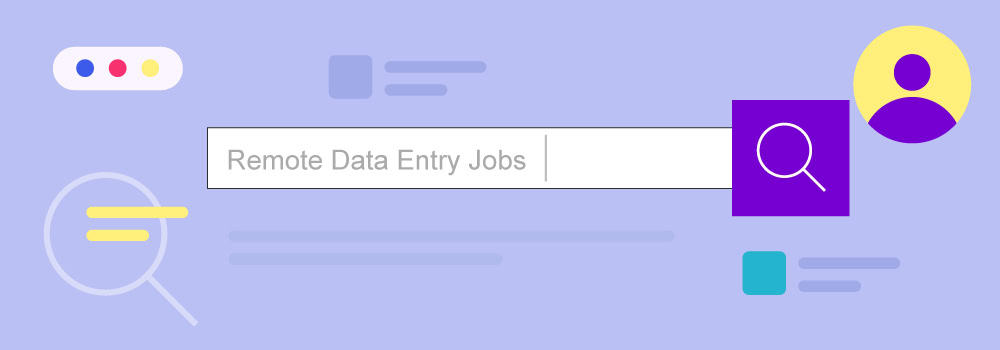The work landscape has evolved dramatically in recent years due to the pandemic. Now more and more people are looking for remote work. Remote data entry work is also a popular job nowadays amongst people.
There are certain differences between regular data entry work and remote data entry work. When you are working from another space, rather than an office, you would require specialized types of equipment and facilities.
In this article, we will be talking about data entry and remote work.
Also, we will explore the intricacies of data entry in the context of remote work, offering insights, strategies, and best practices for success in it.
But, first, let’s understand what remote and regular data entry work is.
What is office data entry work?
Office data entry refers to the process of inputting, updating, and managing information within a physical office setting. Even a couple of years ago, most of the data entry works were performed in an office.
In contrast to remote data entry, where professionals perform these tasks from a location outside of a traditional office, office data entry is conducted within the confines of a physical workplace.
This was all about a traditional Now, let’s see what remote data entry work is.
What is remote data entry work?
Remote data entry work refers to the practice of performing data entry tasks and responsibilities from a location outside of a traditional office setting. Instead of working in a physical office, remote data entry professionals have the flexibility to work from home or any other location with an internet connection.
Below we are mentioning some points that will help you succeed in remote data entry work.
Tips to get success in remote data entry:
Understand The Role of Data Entry in a Remote Setting:
 Data entry is the process of entering, updating, and managing data. It is a fundamental aspect of all businesses. In a remote work setup, data entry professionals play a crucial role in maintaining accurate and organized information without the constraints of a physical office.
Data entry is the process of entering, updating, and managing data. It is a fundamental aspect of all businesses. In a remote work setup, data entry professionals play a crucial role in maintaining accurate and organized information without the constraints of a physical office.
Acquire Essential Skills for Remote Data Entry Professionals:
Remote data entry requires a specific skill set beyond traditional data entry capabilities. Adaptability, self-motivation, effective communication, and proficiency in remote collaboration tools are essential for success.
Creating a Dedicated Workspace:
Establishing a dedicated and organized workspace is vital for remote data entry professionals. A quiet and well-equipped area fosters focus and productivity, minimizing distractions and optimizing workflow.
Utilizing Technology and Tools:
Remote data entry professionals should be adept at utilizing technology and relevant tools. Proficiency in data entry software, collaboration platforms, and time-tracking tools enhances efficiency and ensures seamless communication with team members.
Here are some
Best Practices for Remote Data Entry:
Time Management and Productivity:
Efficient time management is critical for remote data entry success. Setting clear work hours, establishing routines, and using productivity techniques can help manage tasks effectively.
Data Security and Confidentiality:
 Ensuring data security and maintaining confidentiality are paramount in remote data entry. Professionals should adhere to strict security protocols, use secure networks, and follow company guidelines to protect sensitive information.
Ensuring data security and maintaining confidentiality are paramount in remote data entry. Professionals should adhere to strict security protocols, use secure networks, and follow company guidelines to protect sensitive information.
Effective Communication:
Remote work relies heavily on effective communication. Regular check-ins with supervisors and team members, clear documentation of tasks, and utilizing communication tools help foster collaboration and keep everyone on the same page.
Overcoming Challenges:
Addressing Isolation and Loneliness:
Remote work can sometimes lead to feelings of isolation. Data entry professionals should actively seek virtual connections, participate in team activities, and leverage collaboration tools to maintain a sense of camaraderie.
Managing Work-Life Balance:
Striking a healthy work-life balance is crucial for remote data entry professionals. Establishing clear boundaries, scheduling breaks, and knowing when to sign off contribute to overall well-being and sustained productivity.
Continuous Improvement:
Embracing Professional Development is equally important because the field of data entry is continually evolving. Remote professionals should embrace opportunities for continuous learning, staying updated on industry trends, and honing their skills to remain competitive in the remote work landscape.
 Remote work has become a cornerstone of the modern workforce, and data entry professionals are well-positioned to thrive in this environment. By adopting best practices, embracing technology, and maintaining a commitment to professional development, remote data entry professionals can not only succeed but excel in their roles, contributing to the seamless flow of information in our digital age.
Remote work has become a cornerstone of the modern workforce, and data entry professionals are well-positioned to thrive in this environment. By adopting best practices, embracing technology, and maintaining a commitment to professional development, remote data entry professionals can not only succeed but excel in their roles, contributing to the seamless flow of information in our digital age.
If you want to become a successful remote data entry operator, you will require some specialized tools to make your job much easier. Here is the list.
Tools for Success in Remote Data Entry Work:
As remote work continues to surge in popularity, professionals in various fields, including data entry, are adapting to new ways of accomplishing tasks outside the traditional office setting. Remote data entry work demands a suite of tools that ensures efficiency, accuracy, and secure handling of information.
Let’s explore the essential tools that empower remote data entry professionals to excel in their roles.
1. Computer:
The Foundation of Remote Work is a computer. It is the backbone of remote data entry, whether it be a desktop or laptop. Ensuring your machine meets the necessary processing power and system requirements is fundamental to a smooth remote work experience.
2. High-Speed Internet Connection:
A stable and high-speed internet connection is paramount. It facilitates real-time communication, and seamless data transfer, and ensures that you can access online platforms and databases without disruptions.
3. Data Entry Software:
 Specialized data entry software or applications are designed to facilitate data input, management, and organization. Familiarity with these tools enhances efficiency and accuracy in handling various types of information.
Specialized data entry software or applications are designed to facilitate data input, management, and organization. Familiarity with these tools enhances efficiency and accuracy in handling various types of information.
4. Microsoft Excel or Google Sheets:
Spreadsheets are the go-to tools for organizing and manipulating data. Whether using Microsoft Excel or Google Sheets, mastering these platforms is essential for data entry professionals.
5. Document Management Software:
Document management software like Microsoft SharePoint, Google Drive, or Dropbox ensures secure storage and easy collaboration on documents, spreadsheets, and other data-related files.
6. Communication Tools:
Effective communication is key to remote work. Video conferencing tools like Zoom or Microsoft Teams and instant messaging platforms such as Slack facilitate real-time collaboration and maintain a sense of connection with team members.
7. Task Management Tools:
Project management tools like Asana or Trello help data entry professionals keep track of tasks, deadlines, and project progress, promoting efficient workflow management.
8. Time-Tracking Software:
Time-tracking tools like Toggl or Clockify accurately record work hours, ensuring fair compensation and providing insights into productivity.
9. Remote Desktop Software:
Remote desktop tools like TeamViewer or AnyDesk enable troubleshooting and technical support, allowing IT teams to assist with technical issues remotely.
10. VPN (Virtual Private Network):
 A VPN provides a secure and encrypted connection, especially crucial when handling sensitive data. It safeguards information and protects against potential security threats.
A VPN provides a secure and encrypted connection, especially crucial when handling sensitive data. It safeguards information and protects against potential security threats.
11. Headset and Webcam:
Enhancing Virtual Communication A good-quality headset and webcam contribute to clear communication during virtual meetings, enhancing the virtual collaboration experience.
12. Anti-Virus Software:
Protecting Your Workspace is very important. While you work with valuable data, you need to protect it from any cyber data theft or something similar. Reliable anti-virus and anti-malware software are essential to protect your computer and data from potential threats, ensuring a secure work environment.
13. Ergonomic Accessories:
Prioritizing Comfort is an important part of working remotely from your home or somewhere else. Investing in ergonomic accessories, such as a comfortable keyboard, mouse, and chair, is vital to support long hours of remote work and promote overall well-being.
Remote data entry work demands a well-equipped arsenal of tools to navigate the digital landscape effectively. By leveraging these essential tools, professionals can streamline their workflow, maintain data accuracy, and contribute to the success of remote work initiatives. As the remote work landscape continues to evolve, staying adept with these tools ensures data entry professionals are well-prepared for the challenges and opportunities that lie ahead.
Now it’s time to find the actual tasks. No matter what is the job segment, finding a job is a tough job indeed. Here is
A Guide to Finding Remote Data Entry Jobs:
In the ever-expanding realm of remote work, securing a position as a remote data entry professional offers a flexible and dynamic career path. This article serves as a comprehensive guide, outlining strategies and practical steps to help individuals find remote data entry jobs and embark on a journey of virtual productivity.
 1. Understand the Landscape:
1. Understand the Landscape:
Before diving into the job search, it’s crucial to understand the landscape of remote data entry work. Research the industries and companies that commonly hire remote data entry professionals. Familiarize yourself with the skills and qualifications often sought by employers in this virtual domain.
2. Polish Your Data Entry Skills:
Ensure your data entry skills are up to par. Brush up on your proficiency with data entry software, spreadsheet applications (e.g., Microsoft Excel, Google Sheets), and other relevant tools. Certifications or online courses in data entry can also enhance your credentials.
3. Create a Professional Online Presence:
Craft a professional online presence by updating your resume, LinkedIn profile, and any other professional platforms you use. Highlight your data entry skills, relevant experience, and your ability to work remotely.
4. Explore Remote Job Boards:
Dedicated remote job boards are treasure troves for finding virtual opportunities. Websites like Remote OK, FlexJobs, and We Work Remotely feature a variety of remote positions, including data entry roles. Use filters to narrow down your search to data entry or related positions.
5. Utilize General Job Search Platforms:
 Traditional job search platforms like Indeed, Glassdoor, and LinkedIn also feature remote job listings. Use keywords like “remote data entry,” “virtual data entry,” or “telecommute data entry” when searching to refine your results.
Traditional job search platforms like Indeed, Glassdoor, and LinkedIn also feature remote job listings. Use keywords like “remote data entry,” “virtual data entry,” or “telecommute data entry” when searching to refine your results.
6. Company Websites and Career Pages:
Visit the career pages of companies you are interested in working for. Many companies post remote job opportunities directly on their websites. Explore their available positions and submit applications directly through their online portals.
7. Network Within Your Industry:
Networking remains a powerful tool in the job search process. Connect with professionals in your industry through LinkedIn groups, forums, or virtual events. Networking can lead to valuable insights, job referrals, or direct opportunities.
8. Freelance Platforms and Gig Economy:
Explore freelancing platforms like Upwork, Freelancer, or Fiverr. Many businesses and entrepreneurs seek freelance data entry professionals for short-term projects. Building a profile on these platforms can open doors to remote opportunities.
9. Remote Staffing Agencies:
Consider reaching out to remote staffing agencies that specialize in connecting professionals with virtual opportunities. These agencies often have relationships with companies seeking remote workers and can assist in matching your skills with available positions.
10. Set Up Job Alerts:
Take advantage of job alert features on job search platforms. Create customized alerts for “remote data entry” positions, and receive notifications when relevant opportunities are posted.
11. Attend Virtual Career Fairs:
Participate in virtual career fairs or industry-specific events. These platforms provide opportunities to connect directly with recruiters and hiring managers looking for remote talent.
12. Customize Your Cover Letter and Resume:
Tailor your cover letter and resume for each application. Highlight your data entry skills, remote work experience (if applicable), and how your qualifications align with the specific job requirements.
Bottomline:
Finding remote data entry jobs requires a proactive and strategic approach. By leveraging online platforms, networking, and showcasing your skills effectively, you can position yourself as a strong candidate in the competitive landscape of remote work. Embrace the virtual possibilities and embark on a journey toward a rewarding career in remote data entry.
 1. Understand the Landscape:
1. Understand the Landscape:
